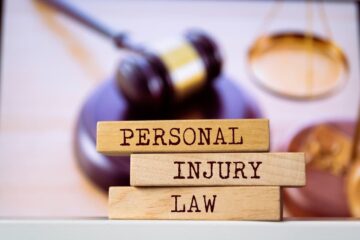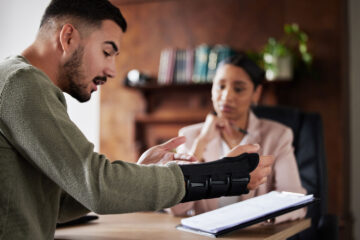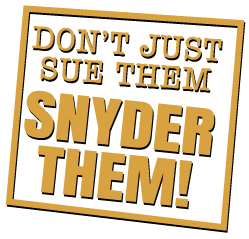Personal Injury Baltimore MD | Expert Legal Advocacy from a Trusted Personal Injury Law Firm, Maryland
If you injure yourself either at work or at home, the last thing you want to worry about is what financial ramifications the injury could lead to. Potential loss in pay from missed work, surgeries and medical fees, and other ancillary components can instantly weigh on you. It’s always better to remain calm and educate yourself on what you need to know in case a viable legal claim is warranted. Unlike a criminal suit, personal injury law refers to the legal remedies and defenses involved in civil lawsuits brought as a result of wrongful conduct. These cases typically involve bodily injury caused by negligence and the private plaintiff seeking compensation for the harm caused by the defendant’s actions — and, more often than not, the injured individual is not even aware of what compensation they may be in line to collect. The experts at the Snyder Law Group, LLC have been helping injured clients know their rights and conduct the needed actions to collect on their entitled reparations.
What is Personal Injury Law in Baltimore, Maryland?
Most personal injury cases are the result of negligence. For example, car accidents caused by drunk drivers, medical complications resulting from a physician’s carelessness, and dog bites that occur when someone’s pet has not been trained to ensure around strangers. In each instance, the responsible party ignored the risk posed to others, and as a result, an innocent individual is injured. If negligence has been established in a personal injury case, the defendant must pay the plaintiff for all injuries caused by the defendant’s actions. This includes medical bills and legal fees, or other financial responsibilities that the plaintiff was initially forced to pay.
If any of the listed incidences apply to you, you may have a warranted reason for a personal injury claim: car and pedestrian accidents, accidents in the workplace, defective product claims, medical malpractice, or slip and fall claims.
Types of Personal Injury Lawsuits Our Attorneys Regularly Handle
At The Snyder Law Group, our experienced attorneys handle a wide range of personal injury cases throughout Baltimore and Maryland. We have extensive experience with these common types of personal injury claims:
- Car and pedestrian accidents happen daily on Baltimore’s busy streets and highways. From minor fender-benders to catastrophic multi-vehicle crashes, our attorneys understand the complexities of Maryland traffic laws. We help victims of drunk driving accidents, distracted driving crashes, rideshare incidents, and commercial vehicle collisions.
- Accidents in the workplace can leave you unable to work and facing mounting medical bills. While workers’ compensation provides some benefits, it may not cover all your losses—especially when third parties share responsibility for your injury. Our attorneys investigate construction accidents, equipment failures, chemical exposures, and other workplace injuries.
- Defective product claims arise when items you use every day cause unexpected harm. Whether it’s a faulty vehicle component, dangerous medication, malfunctioning household appliance, or contaminated food product, manufacturers have a responsibility to ensure their products are safe.
- Medical malpractice occurs when healthcare providers fail to deliver care that meets professional standards. Our attorneys handle cases involving surgical errors, misdiagnoses, medication mistakes, birth injury complications, and improper treatment. With access to top medical experts, we can identify where your care fell below standards.
- Slip and fall claims might sound minor, but these accidents can cause serious injuries like broken bones, head trauma, and spinal damage. Property owners throughout Baltimore have a duty to maintain safe premises. Our attorneys handle cases involving wet floors, icy sidewalks, poor lighting, broken stairs, and other dangerous conditions.

Do You Need an Attorney for a Personal Injury Lawsuit?
After being hurt in an accident, you might wonder if you really need a lawyer. Many people think they can handle insurance claims on their own. The truth? Insurance companies have teams of lawyers working to pay you as little as possible. When you’re dealing with a serious injury in Baltimore, having a personal injury attorney can make a huge difference.
Your attorney will know exactly what your case is worth based on Maryland law and similar Baltimore cases. They’ll handle all communications with insurance companies so you can focus on getting better. An experienced lawyer will gather important evidence before it disappears and find expert witnesses who can explain your injuries and how they impact your life. Perhaps most importantly, they’ll negotiate for a fair settlement or take your case to court if needed.
Without a dedicated accident lawyer, many people accept settlements that don’t cover their long-term needs. Some studies show that injury victims with attorneys receive up to 3.5 times more compensation than those who represent themselves.
Maryland’s “contributory negligence” rule makes having an attorney even more important. Unlike most states, in MD, if you’re found even 1% responsible for your accident, you could lose your right to any compensation. An experienced Baltimore personal injury lawyer knows how to protect you from these claims.
How Long Do You Have to File a Claim?
In Baltimore and throughout Maryland, you don’t have forever to file a personal injury lawsuit. The state has strict deadlines called “statutes of limitations” that limit how long you have to seek compensation.
For most personal injury cases in Maryland, you have three years from the date of your injury to file a lawsuit. This might seem like a long time, but building a strong case takes time. Evidence can disappear, witnesses can forget details, and medical records need to be gathered.
There are exceptions to this timeline. If the injured person is a minor (under 18), the three-year clock typically doesn’t start until they turn 18. Medical malpractice cases may allow the clock to start when you discover the injury, not when it occurred. Claims against government entities often have much shorter notice requirements—sometimes just a few months.
Missing these deadlines means losing your right to compensation forever, no matter how strong your case might be. That’s why contacting a personal injury attorney in Baltimore as soon as possible after your injury is so important.
How Much Does it Cost to Hire a Personal Injury Lawyer?
Many people worry about legal fees after an injury, especially when medical bills are already piling up. At The Snyder Law Group in Baltimore, personal injury cases are handled on a “contingency fee” basis. This means you pay no upfront costs or hourly fees. Your attorney only gets paid if you win your case, and legal fees come as a percentage of your settlement or verdict. If you don’t recover money, you don’t owe attorney fees.
This arrangement makes quality legal representation accessible to everyone, regardless of financial situation. The typical contingency fee for personal injury cases in Maryland ranges from 33% to 40% of the recovery amount, depending on whether the case settles or goes to trial.
Beyond the contingency fee, your case may involve some costs like court filing fees, expert witness fees, medical record costs, and deposition expenses. A reputable Baltimore personal injury law firm like The Snyder Law Group will discuss these potential costs with you clearly at the beginning of your case and handle these expenses until your case resolves.
The Process for Filing a Personal Injury Lawsuit in Maryland
The personal injury process in Maryland follows several important steps:
Having Your Attorney Submit the “Complaint”
The formal lawsuit begins when your attorney files a document called a “complaint” with the court. This legal document outlines who was involved in the incident, what happened to cause your injury, how the defendant was negligent, and what damages you’re seeking.
In Baltimore courts, the complaint must follow specific formatting requirements and include enough detail to support your claims. Once filed, the defendant must be “served” with the complaint, giving them official notice of the lawsuit.
Negotiating with the Insurance Company and/or Preparing to Go to Trial
After filing, both sides exchange information through a process called “discovery.” This includes written questions (interrogatories), document requests, and depositions (recorded interviews under oath).
During this time, settlement negotiations often take place. Your Baltimore personal injury attorney will present evidence of your injuries and damages to the insurance company or defense lawyers. Most personal injury cases in Maryland settle during this phase, but The Snyder Law Group always prepares each case as if it will go to trial.
If a fair settlement can’t be reached, your case proceeds to trial where a judge or jury will decide the outcome.
Contact

Recovering Compensation
If your case is successful, whether through settlement or trial verdict, you’ll receive compensation for your injuries. The payment process varies depending on your specific situation. Settlement checks typically arrive within 4-6 weeks after an agreement, while trial verdicts may take longer, especially if appeals are filed. Your attorney will handle liens from medical providers or health insurance, and structured settlements may be arranged for larger amounts.
Your Baltimore personal injury attorney will help calculate the total costs of your injury, including future expenses, to make sure you receive fair compensation.
The Types of Damages Available in a Personal Injury Lawsuit in Maryland
In Maryland personal injury cases, you may be entitled to several types of compensation. Economic damages cover quantifiable financial losses such as medical expenses (past and future), lost wages and reduced earning capacity, property damage, rehabilitation costs, home modification expenses, and transportation to medical appointments.
Non-economic damages compensate for non-financial impacts on your life. These include pain and suffering, emotional distress, loss of enjoyment of life, disfigurement or scarring, and loss of consortium (impact on relationships).
Maryland does place a cap on non-economic damages in personal injury cases. As of 2024, the cap is approximately $935,000 for most personal injury cases. This cap increases slightly each year.
In rare cases involving extreme negligence, punitive damages might be available, though they’re very difficult to obtain under Maryland law.
The Elements of “Negligence” in a Personal Injury Claim
To win your personal injury case in Baltimore, you need to prove four key elements of negligence. Each of these elements must be established for your claim to succeed.
Duty of Care
The first step is showing that the defendant owed you a legal duty of care. This means they had a responsibility to act in a reasonably safe manner to prevent harm. Duty of care varies by situation. Drivers must follow traffic laws and operate their vehicles safely. Property owners need to maintain safe premises for visitors. Healthcare providers must deliver care that meets professional standards. Manufacturers have a duty to produce safe products. Your personal injury attorney will help establish exactly what duty the defendant owed you based on Maryland law.
Breach of Duty
After establishing that a duty existed, you must prove the defendant failed to meet that duty—either through their action or failure to act. A driver who runs a red light has breached their duty. A doctor who ignores standard treatment protocols has breached their duty. The key is showing that a reasonable person in the same situation would have acted differently.
Causation
The third element requires proving that the defendant’s breach of duty directly caused your injuries. This has two parts: actual cause and proximate cause. Actual cause means showing your injuries wouldn’t have happened without the defendant’s actions. Proximate cause means showing your injuries were a foreseeable result of their negligence—not something so unusual that no one could have predicted it. This can be one of the most complicated elements to prove in Baltimore personal injury cases.
Damages
Finally, you must demonstrate that you suffered actual harm that can be compensated with money. Physical injuries, medical expenses, lost wages, property damage, and pain and suffering all qualify as damages. Without measurable damages, a personal injury claim cannot succeed even if someone acted negligently. Your attorney will document all your losses to build this part of your case.
Maryland’s “contributory negligence” rule makes proving all four elements critical. If the defense can convince a judge or jury that you were even 1% responsible for your injuries, you could lose your right to any compensation at all. This makes having an experienced Baltimore personal injury attorney particularly important.
What Evidence to Collect in a Maryland Personal Injury Case
Strong evidence forms the foundation of every successful personal injury case. Here’s what you should gather to support your claim:
Accident Reports
Official reports provide a neutral third-party account of what happened. Police reports for car accidents contain important details like date, time, location, weather conditions, and the officer’s observations about who was at fault. For workplace injuries, incident reports filed with employers or OSHA document the circumstances of your accident. For premises liability cases like slip and falls, any incident report filed with the property owner can be valuable evidence. Get copies of these reports as soon as possible.
Photographs and Videos of the Accident Scene
Visual evidence is powerful and can preserve details that might otherwise be forgotten or changed. Take photos of the accident scene from multiple angles, showing any hazardous conditions that contributed to your injury. Document physical damage to vehicles, broken stairs, wet floors, or defective products. Capture relevant road signs, traffic signals, or warning signs (or their absence). If security cameras, traffic cameras, or bystanders recorded the incident, act quickly to preserve this footage before it’s deleted.
Medical Records
Medical documentation creates the official record of your injuries and links them to the accident. Keep all records from emergency room visits, doctor appointments, specialist consultations, and therapy sessions. Make sure your medical providers note the cause of your injuries in their records. Follow all treatment recommendations and attend all appointments—gaps in treatment can be used against you. These records help prove both the existence and severity of your injuries.
Medical Bills
Financial documentation helps establish the economic damages portion of your claim. Save all bills, invoices, and receipts related to your medical care. This includes hospital stays, doctor visits, medications, medical equipment, and therapy sessions. Also document transportation costs to medical appointments and any home modifications needed because of your injuries. These expenses form a significant part of your compensation claim.
Financial Documents
Beyond medical costs, document all financial impacts of your injury. Pay stubs or employment records showing lost wages or reduced hours help prove income loss. If your injuries affect your ability to work in the future, you may need documentation from your employer and vocational experts. Keep receipts for property replacement or repair, childcare expenses during recovery, and any other costs directly resulting from your accident.
Witness Testimony
People who saw what happened can provide crucial support for your version of events. Collect the names, phone numbers, and addresses of anyone who witnessed your accident. Your attorney will contact them to get formal statements. Witnesses can include bystanders, passengers, coworkers, or anyone else present when you were injured. Their independent accounts can counter the defendant’s version of events.
Expert Opinions
Complex cases often require testimony from experts in specialized fields. Medical experts can explain the extent of your injuries, necessary treatments, and long-term prognosis. Accident reconstruction specialists can determine exactly how an incident occurred. Economic experts can calculate lifetime financial losses from permanent injuries. Mental health professionals can testify about emotional trauma. The right experts lend credibility and clarity to complicated aspects of your case.
Your Baltimore personal injury attorney will help you gather and preserve all this evidence. The sooner you contact a lawyer after your injury, the more likely important evidence will be available to support your claim.

Why Trust The Snyder Law Group?
The Snyder Law Group, LLC proudly represents clients throughout Maryland and Washington, D.C. Our experienced Baltimore attorneys understand the frustration that comes with an insurance company, medical professional, or other party that refuses to accept liability for negligent or reckless behavior. You can take heart in knowing there are talented and experienced lawyers ready to work for you.
When you’re dealing with the aftermath of a personal injury in Baltimore, you need injury lawyers who know Maryland law inside and out. Our legal team has helped countless clients through the personal injury claim process. We’ve stood up to insurance companies, negotiated fair settlements, and when necessary, taken cases to trial to get our clients the compensation they deserve.
Your recovery should be your primary focus after an injury. Let our injury lawyers handle the legal complexities while you concentrate on healing. From gathering evidence to consulting with experts to negotiating with insurance adjusters, we’ll manage every aspect of your case with the care and attention it deserves.
Further Reading
Explore the variety of personal injury cases with our guide on common types of personal injury cases, which breaks down the most frequent claims handled by attorneys. This overview helps you understand the scope of personal injury law and what might apply to your situation.
Learn how compensation is determined in our detailed post about the types of damages in a personal injury case, covering everything from medical expenses to emotional distress. It’s a must-read for anyone seeking fair recovery after an injury.
Filing a claim can feel overwhelming, but our article on what steps are involved in filing a personal injury lawsuit walks you through the process step-by-step. Gain clarity on how to start and what to expect along the way.
Defective products can lead to serious injuries, and our comprehensive guide, everything you need to know about product liability claims, explains your rights and options. It’s essential reading if you’ve been harmed by a faulty item.
Pedestrian accidents carry unique risks, as explored in the hazards of pedestrian parking lot accidents, which highlights common dangers and liability issues. This post sheds light on a lesser-known but critical area of personal injury.
Don’t fall for misinformation—our post on 4 common myths about personal injury cases debunks popular misconceptions that could affect your claim. Get the facts to make informed decisions about your case.
Frequently Asked Questions
What is the personal injury law in Maryland?
Personal injury law in Maryland allows individuals who have been injured due to someone else’s negligence to seek compensation for their damages. Maryland follows a “contributory negligence” rule, which means if you are found to be even 1% at fault for your injury, you may be barred from recovering any compensation. This makes having experienced legal representation particularly important in Maryland personal injury cases.
What is personnel injury?
A personal injury refers to physical, emotional, or psychological harm suffered due to someone else’s negligence or intentional actions. Unlike property damage, personal injuries affect your body, mind, or emotions. These injuries can range from minor cuts and bruises to severe trauma like brain injuries, spinal cord damage, or even death. Personal injury law provides a way for victims to seek financial compensation for these harms.
What is an example of personal injury?
Common examples of personal injuries include whiplash from car accidents, broken bones from slip and falls, burns from defective products, injuries from medical errors, dog bites, traumatic brain injuries, and psychological trauma following an accident. In Baltimore, we commonly see injuries from auto accidents on busy highways like I-83 and I-695, workplace accidents in the city’s industrial areas, and slip and falls during winter weather conditions.
What is personal injury compensation?
Personal injury compensation is money awarded to injury victims to make them “whole” again after an accident. This compensation can cover medical expenses (both current and future), lost wages, property damage, pain and suffering, emotional distress, and loss of enjoyment of life. In Maryland, compensation typically falls into two categories: economic damages (financial losses) and non-economic damages (pain and suffering), with the latter being capped by state law.
How to make a personal injury claim?
To make a personal injury claim in Baltimore, start by seeking medical attention immediately after your injury. Then, contact an experienced personal injury attorney who can guide you through the process. Your attorney will help you gather evidence, notify the responsible parties, communicate with insurance companies, and either negotiate a settlement or file a lawsuit. Most claims begin with an insurance claim, but if a fair settlement can’t be reached, your attorney may recommend filing a lawsuit in Maryland courts.
What is the most common personal injury claim?
The most common personal injury claims in Baltimore and throughout Maryland are auto accident cases. These include car crashes, truck accidents, motorcycle collisions, pedestrian accidents, and bicycle incidents. Other common claims include slip and falls (premises liability), workplace accidents, medical malpractice, and injuries from defective products. Each type of claim involves different laws and standards of proof, which is why specialized legal knowledge is so important.
Call 410-THE-FIRM (843-3476) For a Free Case Evaluation
The Snyder Law Group, LLC proudly represents clients throughout Maryland and Washington, D.C. Our experienced attorneys understand the frustration that comes with an insurance company, medical professional, or other party that refuses to accept liability for negligent or reckless behavior. You can take heart in knowing there are talented and experienced lawyers ready to work for you.
